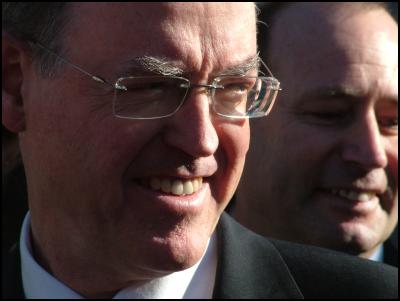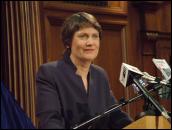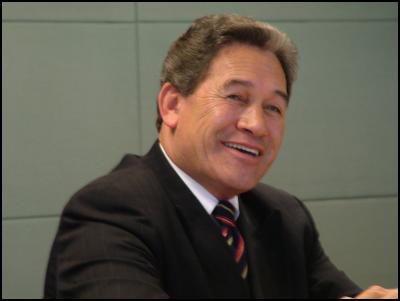Labour Strategy Resembles John Howard Tactics
Labour Strategy Resembles John Howard Tactics
State Of It: by Selwyn Manning - Scoop Co-Editor
Labour has revealed a campaign strategy that has an uncanny likeness to that which pulled Australia's Prime Minister John Howard back from the brink of defeat. Here Scoop examines this move and considers how Labour's king-hit tertiary policy is part of a plan to relegate National onto the back-foot.
 The New Zealand Herald
this morning parroted the frustration of the right:
"Cynicism and desperation abound in equal measure in the
Labour Party's $300 million-a-year pledge to abolish
interest on student loans. This is political bribery at its
most base. It bodes ill for what is to come during this
election campaign."
The New Zealand Herald
this morning parroted the frustration of the right:
"Cynicism and desperation abound in equal measure in the
Labour Party's $300 million-a-year pledge to abolish
interest on student loans. This is political bribery at its
most base. It bodes ill for what is to come during this
election campaign."
It concluded: "Bribes are, of course, part of the landscape of every election campaign. Few, however, are so obviously calculated to buy votes, or delivered so early in the piece. Democracy will be poorly served if this is a harbinger of policies to come."
The editorial writer ought to unfurl from the blue-cloth and smell the pragmatic roses. Clearly this tertiary policy is designed to win votes, just as National's tax-cuts call (which clearly has National's analysts frazzled while calculating the consequences) capitalised on a public mood that considered it a public right. In Labour's case, the tertiary policy is responding to both of those stimulants with the added incentive of public need.
This tertiary policy, if adopted, would address a series of broader consequential problems that have proven problematic for Labour over the past six years: like how student loans have changed the behaviour of an entire generation, reduced the affordability of homes, affected the affordability of starting new families, fuelled emigration, and countered moves to re-distribute wealth to those engaged in their productive years. The policy signals a commitment by Labour (while understandably viewed cynically by some) to invest in those who are able to acquire 21st century skills and knowledge.
Politically, as respected Herald political commentator John Armstrong said in a more considered piece, Clark has effectively consigned one of the opposition's prize tax policies to the knackers' yard less than a week after National announced it.
It has also forced National into a defensive number-crunching ditch while it calculates estimations on what it can deliver on law and order, commerce incentives, trade and enterprise and development all-the-while reintroducing tax-cut ideology.
Labour's tertiary policy is designed not just to win support from students, but also from their parents and grandparents. Politically, it's clearly a well reasoned position, while destroying a key plank of National's tax policy, it has delivered a strong solution to address the so-called brain-drain.
National's support base says the brain-drain isn't necessarily the sole domain of the academic, but that New Zealand's skilled industrial and trade-based workforce has been bleeding to Australia and the United Kingdom. While that may be true, one must remember that it was National while in government that sucked the life-blood out of apprenticeship training, and, like a corporate raider that drains an enterprise of its productive assets, National created and advanced New Zealand's trade-skill slide and immigrant dependency (health, education, construction, skilled-manufacturing industries considered).
Labour's tertiary and trade and industry skills packages have caused Brash and National finance spokesperson John Key to attempt to stall its tax launch date and drum down public expectations of meaningful tax-relief. But this begs the question, if Brash wobbles on tax while in opposition, how can he be relied on to deliver should he take the Treasury benches?
Once National delivers its tax policy, Brash and Key will be forced to debate planned cuts to the public service, what areas of health, education, law and order, justice, and social welfare will be reformed to deliver the so-called efficiency gains ( a term so often heard during the reigns of former National finance minister Ruth Richardson and former National health minister Jenny Shipley in the 1990s).

Clearly, Clark's political strategists have examined the Australian Labor Party's (ALP) landslide defeat to John Howard in the last federal election.
Clark appears to have taken a leaf out of Australian Prime Minister John Howard's book. In the lead up to the 2004 federal campaign the Liberal/Nationals coalition government was running slightly behind the ALP - although Howard was far ahead of the then ALP leader Mark Latham as preferred Prime Minister.
Howard called an election that allowed for a long campaign. Latham, who looked young and fresh compared to the tired-looking Coalition government, was wrong-footed almost from day-one and continued to stumble as Howard out-flanked Latham on policy announcement after policy announcement.
The final straw came with Howard's forestry policy, announced in Tasmania was met by rapturous applause by forestry union members. That policy cost the ALP the marginal seats of Bass and Braddon alone. In the end Labor was probably lucky that the election was held when it was, and not a week later, as even more seats would have been lost.
The NZ situation has been somewhat similar. The New Zealand Labour government blew a significant lead and is now polling close to where it polled on election night 2002. It must be remembered that the actual composition of Parliament following the 2002 election was very finely balanced - the marked difference at this time of course being the redistribution of Labour's centre-right vote having bled to New Zealand First, National and National having also benefited from the collapse of ACT.
Currently, Clark's strategy is to allow Brash to set an early agenda (as with tertiary and trade and industry skills policies) and then knobble him on it. It appears Clark will use this technique until public and media attention leans toward anticipating her next move. Her strategy will then move to front-foot policy and render Brash as a follower - thus sapping him of the perception of a leader in waiting.
The strategy displays a "timing agenda".
 Foreign policy
last week was used to expose Brash's unease and hesitation.
This week, Clark used the tertiary policy to step into
Brash's shadow and shift his spotlight onto herself. This
aspect of the strategy was designed to force Brash to:
Foreign policy
last week was used to expose Brash's unease and hesitation.
This week, Clark used the tertiary policy to step into
Brash's shadow and shift his spotlight onto herself. This
aspect of the strategy was designed to force Brash to:
1. release his taxation policy too early 2. or make Brash appear unable to table his tax cut plan.
The crucial stage in Labour's campaign will be once the strategy moves into second-gear: when Brash is forced to follow social-provision policy launches with his perhaps ill-timed fiscal reform plan. At this stage Labour will attempt to pressure Brash to explain how he will deliver on key policy while cutting taxes, and how he will avoid a consequential rise in home mortgage interest rates. The move is designed to expose his leadership wobbles, media delivery, hesitations and stammers.
Clark will build a raft of social-provision policy planks that provide solutions to voter concerns. It will calculate these so that delivery is reliant on Labour's own taxation plan as estimated in the Budget and updated with fresh data regarding the continued buoyancy of the Auckland economy.
Clark will engineer to focus public
comparative attention on what Brash can deliver while
cutting taxes to a degree that his team has led NZ to
expect.
It is a tight strategy, but it will be
interesting to see how effective it will be in swinging the
party enough (from an economic axis point of view) to
collect the necessary immediate centre-right voters. One
thing is for sure, Labour caused the erosion of substantial
support due to a feeling that the Party was out of step with
the public over its social-engineering legislative agenda of
its second term, as opposed to its social democratic/social
justice agenda as characterised during its first
term.
Voter concerns over the performance of Labour's second-tier ministers is likely to be less damaging to Labour once campaign-proper begins and attention shifts almost entirely to a battle between the leaders. Clark will likely advance this.
New Zealand First looks as if it has fired too soon, and its leader Winston Peters will not be able to use Parliament to advance his expose-styled shock-horror-incompetence strategy during the campaign-proper.
If National is to salvage its poll-growth-curve it would be wise to massage public attention not on a leadership presidential-styled campaign but on highlighting Labour's poor performing ministers while presenting a cabinet-in-waiting team. A battle between Clark and Brash will never be won by National.
The other factor creating difficulty for Labour is the Maori Party. Even Labour's own strategists are admitting the Maori Party is set to win five of the Maori seats.
The Maori Party has tried a grass-roots campaign with a well researched door knocking plan which has seen every Maori home in key electorates visited by a party campaign advocate. Maori demographics have been analysed, numbers crunched, not so much to shape policy (which remains very elusive at best, and potentially divisive at worst) but on how to ensure exposure to the people will result in a win. It is also a fact that those enrolling on the Maori Roll are being found to be more supportive of a race-based party than one ruled by Pakeha and aligned to Ratana which is seen as historical and as having not delivered the concept, let alone the degree, of self determination that is demanded on Marae and within urban Maori networks. Even though co-leaders Dr Pita Sharples and Tariana Turia have offered some strange remarks over Robert Mugabe's Zimbabwe, and also a rather strange position over the Meningococcal vaccine debate, the core of the Maori Party's support won't care, they want Tino Rangatiratanga and they don't care for the fine print.
With five seats under its belt, the Maori Party will create an overhang that, on current poll standings, will position it as a support-party on confidence and supply for National and New Zealand First.
It is unlikely the Maori Party would provide the percentage numbers to push Labour to victory.
The key to who wins this election lies in a First Past the Post (FPP) styled race between National and Labour for the highest percentage.
Should National dip a nose in front of Labour, then my pick is that New Zealand First will move into bed in coalition with National.
Should Labour spoil National's run and hit the last week of the campaign running, then, with a percentage win over National my pick is Labour would form a minority government, drawing unto itself the Greens, offer United Future leader Peter Dunne internal affairs, and permit Jim Anderton to continue to enjoy developing regional economies. If current polls are accurate and New Zealand First's percentage does not collapse, this grouping would be totally reliant on Winston Peters.

But, my prediction, albeit from a long way out... is New Zealand First would not enter into a coalition with Labour but support it on confidence and supply while influencing policy and publicly parade the perception of power and influence for the duration of the next term.
ENDS
ref.


 Ramzy Baroud: Netanyahu's Endgame - Isolation And The Shattered Illusion Of Power
Ramzy Baroud: Netanyahu's Endgame - Isolation And The Shattered Illusion Of Power Jeremy Rose: Starvation Of Gaza A Continuation Of A Decades-old Plan
Jeremy Rose: Starvation Of Gaza A Continuation Of A Decades-old Plan Keith Rankin: The Aratere And The New Zealand Main Trunk Line
Keith Rankin: The Aratere And The New Zealand Main Trunk Line Gordon Campbell: On The Mock Horror Over Political Profanity
Gordon Campbell: On The Mock Horror Over Political Profanity Ian Powell: Predictable Smear On Senior Doctors
Ian Powell: Predictable Smear On Senior Doctors Binoy Kampmark: Trump, Planes And The Arabian Gulf Tour
Binoy Kampmark: Trump, Planes And The Arabian Gulf Tour